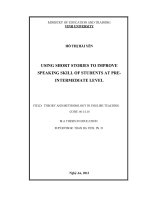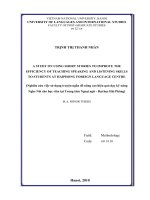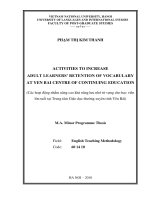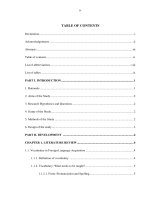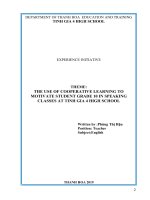Using short stories to motivate intermediate efl learners in essay writing at vietnam centre point
Bạn đang xem bản rút gọn của tài liệu. Xem và tải ngay bản đầy đủ của tài liệu tại đây (823.98 KB, 139 trang )
MINISTRY OF EDUCATION AND TRAINING
HO CHI MINH CITY UNIVERSITY OF TECHNOLOGY
-------------------------------
NGUYEN TRUONG GIANG
USING SHORT STORIES TO MOTIVATE
INTERMEDIATE EFL LEARNERS
IN ESSAY WRITING
AT VIETNAM CENTRE POINT
Major: English Language
Course code: 8220201
HO CHI MINH CITY, SEPTEMBER 2020
MINISTRY OF EDUCATION AND TRAINING
HO CHI MINH CITY UNIVERSITY OF TECHNOLOGY
-------------------------------
USING SHORT STORIES TO MOTIVATE
INTERMEDIATE EFL LEARNERS
IN ESSAY WRITING
AT VIETNAM CENTRE POINT
Submitted to the
Faculty of English Language
in partial fulfillment of the Master’s degree in English Language
Course code: 8220201
By
NGUYEN TRUONG GIANG
Supervised by
LE THI THANH, Ph.D.
HO CHI MINH CITY, SEPTEMBER 2020
The thesis entitled: USING SHORT STORIES TO MOTIVATE INTERMEDIATE EFL
LEARNERS IN ESSAY WRITING AT VIETNAM CENTRE POINT was successfully
defended and approved on ……………….. at Hochiminh City University of Technology
(HUTECH).
Academic supervisor: LÊ THỊ THANH, Ph.D.
Examination Committee
1. Nguyễn Thị Kiều Thu, Ph.D.
Chair
2. Trần Quốc Thao, Ph.D.
Reader 1
3. Đinh Văn Sơn, Ph.D.
Reader 2
4. Nguyễn Đăng Nguyên, Ph.D.
Member
5. Lê Văn Tuyên, Ph.D.
Secretary Member
On behalf of the Examination Committee Chair
i
HCMC UNIVERSITY OF TECHNOLOGY
POSTGRADUATE INSTITUTE
HCMC, SEPTEMBER 2020
MASTER’S THESIS REPORT
Student name: NGUYỄN TRƯỜNG GIANG
Sex: Male
Date of birth: 06/11/1989
Place of birth: Dong Thap
Major: English Language
Student code: 1841900038
I- Thesis title:
USING SHORT STORIES TO MOTIVATE INTERMEDIATE EFL LEARNERS IN
ESSAY WRITING AT VIETNAM CENTRE POINT
II- Objectives and contents:
This study aims at investigating using short stories to motivate intermediate EFL
leaners in essay writing at Vietnam Centre Point. The specific objectives of this
study are as follows:
• To find out the attitudes of the EFL learners towards using short stories.
• To identify the practicality of short stories in motivating writing essays of
intermediate learners.
The study was conducted at Vietnam Centre Point. The participants of this study
were 45 EFL learners in 3 to 4 different classes at the level of Intermediate in
Vietnam Centre Point. The data was gathered by a questionnaire and semi-structured
interview. The results were analysed in terms of means, standard deviations and
content analysis. This study also informs the discussions of the results and some
valuable implications for learners, teachers as well as administrators.
ii
III- Starting date: 30/03/2020
IV- Completing date: 20/09/2020
V- Academic supervisor: LÊ THỊ THANH, Ph.D.
ACADEMIC SUPERVISOR
FACULTY DEAN
(full name, signature)
(full name, signature)
iii
CERTIFICATE OF ORIGINALITY
I certify my authorship of the Master’s Thesis submitted today entitled:
USING SHORT STORIES TO MOTIVATE INTERMEDIATE EFL
LEARNERS IN ESSAY WRITING AT VIETNAM CENTRE POINT
In terms of the statement of requirements for Theses in Master’s programs issued by
the Higher Degree Committee of Faculty of English Language, Ho Chi Minh City
University of Technology.
Ho Chi Minh City, September 2020
NGUYEN TRUONG GIANG
iv
RETENTION AND USE OF THE THESIS
I hereby state that I, NGUYEN TRUONG GIANG, being a candidate for the degree of
Master of Arts (English Language) accept the requirements of the University relating
to the retention and use of Master’s Theses deposited in the Library.
In terms of these conditions, I agree that the original of my Master’s Thesis deposited
in the Library should be accessible for purposes of study and research, in accordance
with the normal conditions established by the Librarian for the care, loan, and
reproduction for theses.
Ho Chi Minh City, September 2020
Signature…………………………….
NGUYEN TRUONG GIANG
v
ACKNOWLEDGEMENT
In preparing and writing this thesis, I have benefited greatly from the support of many
lecturers, teachers, friends and learners. First and foremost, I would first like to express
my deepest gratitude to Dr. Le Thi Thanh, my supervisor, for her patience, guidance,
insightful advice, and constant encouragement through the whole research process.
Under any circumstances, she always gives me her warm support and dedication. She
has been a wonderful mentor and I feel grateful for having such a wonderful instructor.
Without her support and guidance, this thesis would never have been completed.
Second, I would also like to show my profound gratitude to all the lecturers of the
Institute for Postgraduate and the Department of English Language in HUTECH for
their tirelessly devoting time and efforts to enrich, broaden and deepen my knowledge
over the past two years.
Third, I would like to send my gratefulness to some of the enthusiastic teachers and
learners from Vietnam Centre Point who helped me to provide and collect valuable
data for the questionnaire and interview. My work could not be done without the
participation of teachers and learners at this centre.
Plus, I would like to thank the management board of Vietnam Centre Point for
allowing me to conduct this study. I also would like to send my sincere thanks to one
academic staff who was very dedicated to helping me disseminate the questionnaires,
which was really significant for achieving the required sample.
vi
ABSTRACT
Literature is one of the biggest sources of materials in teaching language, especially in
teaching English. Therefore, it is expected to conduct a study to investigate using short
stories to motivate intermediate EFL learners in essay writing at Vietnam Centre Point.
More specifically, this study concerned in 45 intermediate leaners who were studying at
Vietnam Centre Point, the researcher’s workplace, from March to September 2020. This
study adopted a sequential mixed method approach to data collection and analysis. Both
quantitative and qualitative data were gathered from the questionnaire and semi-structured
interviews, and then were analyzed by SPSS 20.0 to discover the results of the research.
The findings expressed that attitudes of the learners (containing affective, behavioral and
cognitive components) and factors motivating them (consisting of intrinsic and extrinsic
motivation) in their essay writing through using short stories mostly had positive outcomes.
The result of the research also demonstrated most of the participants felt that using short
stories helped them to write more effectively while they had a higher concentration when
reading short stories and collected many useful words and phrases for their essay writing.
Concerning motivation toward the learners, the learners had great enjoyment of
experiencing the storyline, and they could decline several mistakes in writing. Due to the
findings of the study, recommendations for the learners, teachers, and administrators may
use appropriate activities for the learners, using literary works for example, in order to
create better teaching language method. It is expected the study will devote to the existing
knowledge relevant to the field of study, references for learners, teachers and researchers
who desire to study the learning and teaching of essay writing, or the use of short stories.
Keywords: writing, short stories, motivation, attitude, essay.
vii
TABLE OF CONTENTS
Page
Master’s thesis report ............................................................................................. ii
Certificate of originality .......................................................................................... iv
Retention and use of the thesis ................................................................................ v
Acknowledgements .................................................................................................. vi
Abstract ................................................................................................................... vii
Table of contents ..................................................................................................... viii
List of tables ............................................................................................................ xiii
List of figures ........................................................................................................... xiv
List of abbreviations and symbols .......................................................................... xv
CHAPTER 1: INTRODUCTION ............................................................................ 1
1.1 Background to the study ....................................................................................... 1
1.2 Statement of the problem ...................................................................................... 3
1.3 Aims and objectives ............................................................................................. 4
1.4 Research questions ............................................................................................... 5
1.5 Scope of the study ................................................................................................ 5
1.6 Significance of the study ...................................................................................... 6
1.7 Definition of key terms......................................................................................... 6
viii
1.8 Organization of the thesis ..................................................................................... 7
CHAPTER 2: LITERATURE REVIEW ................................................................ 8
2.1 Introduction .......................................................................................................... 8
2.2 Writing ................................................................................................................. 8
2.2.1 Definitions of writing ....................................................................................... 8
2.2.2 Levels of writing .............................................................................................. 9
2.2.2.1 Sentence ......................................................................................................... 10
2.2.2.2 Paragraph ....................................................................................................... 10
2.2.2.3 Essay .............................................................................................................. 11
2.2.3 The process of writing ....................................................................................... 12
2.2.4 Teaching writing ............................................................................................... 14
2.2.5 Methods of teaching writing .............................................................................. 15
2.3 Motivation ............................................................................................................ 16
2.3.1 Definitions of motivation................................................................................... 16
2.3.2 Types of motivation........................................................................................... 17
2.3.2.1 Intrinsic motivation ........................................................................................ 17
2.3.2.2 Extrinsic motivation ....................................................................................... 18
2.3.3 Motivation in English language teaching ........................................................... 20
2.4 Using short stories to motivate writing ................................................................. 21
2.4.1 Definitions of short stories................................................................................. 21
ix
2.4.2 Elements of a story ............................................................................................ 21
2.4.2.1 The theme....................................................................................................... 22
2.4.2.2 The point of view .......................................................................................... 22
2.4.2.3 The plot .......................................................................................................... 23
2.4.2.4 The characterization ....................................................................................... 23
2.4.2.5 The setting ...................................................................................................... 24
2.4.2.6 The irony ........................................................................................................ 24
2.4.2.7 The symbolism ............................................................................................... 25
2.4.3 Short stories in teaching and learning EFL ........................................................ 25
2.5 The connection of reading and writing skills ........................................................ 28
2.6 Learners’ attitudes in writing skills ....................................................................... 30
2.6.1 Definitions of attitudes ...................................................................................... 30
2.6.2 Types of attitudes .............................................................................................. 31
2.6.3 Attitudes in language learning ........................................................................... 33
2.6.4 Attitudes towards motivation in English learning .............................................. 33
2.7 Previous studies.................................................................................................... 34
2.8 Conceptual framework ......................................................................................... 38
2.9 Summary .............................................................................................................. 40
CHAPTER 3: METHODOLOGY ........................................................................... 41
3.1 Introduction .......................................................................................................... 41
x
3.2 Research design.................................................................................................... 41
3.3 Research site ........................................................................................................ 42
3.4 Sample and sampling procedures .......................................................................... 43
3.5 Research instruments ............................................................................................ 46
3.5.1 Questionnaire ................................................................................................... 47
3.5.2 Interview .......................................................................................................... 48
3.6 Data collection procedures ................................................................................... 50
3.7 Data analysis procedures ...................................................................................... 52
3.8 Reliability and Validity ....................................................................................... 53
3.9 Ethical issues ........................................................................................................ 56
3.10 Summary ........................................................................................................... 56
CHAPTER 4: RESULTS AND DISCUSSIONS .................................................... 58
4.1 Introduction ......................................................................................................... 58
4.2 Results of the study ............................................................................................. 58
4.2.1 Learner’s attitudes towards using short stories in enhancing writing essays ....... 58
4.2.2 Factors motivating EFL learners in essay writing through short stories.............. 66
4.3 Discussions ......................................................................................................... 72
4.3.1 Learner’s attitudes towards using short stories in enhancing writing essays ....... 72
4.3.2 Factors motivating EFL learners in essay writing through short stories.............. 74
4.4 Summary ............................................................................................................. 76
xi
CHAPTER 5: CONCLUSIONS .............................................................................. 78
5.1 Summary of the main findings of the thesis ......................................................... 78
5.2 Pedagogical implications ..................................................................................... 79
5.2.1 Implications for learners ................................................................................... 79
5.2.2 Implications for teachers ................................................................................... 80
5.2.3 Implications for administrators ......................................................................... 81
5.3 Limitations .......................................................................................................... 82
5.4 Recommendations for further research ................................................................ 82
REFERENCES ........................................................................................................ 83
APPENDICES ......................................................................................................... 95
APPENDIX A: Questionnaire for learner (English version) ................................. 95
APPENDIX B: Questionnaire for learner (Vietnamese version) ........................... 100
APPENDIX C: Interview protocol (English version) ............................................. 105
APPENDIX D: Interview protocol (Vietnamese version) ...................................... 107
APPENDIX E: The learners’ interview transcript (English version) .................... 109
APPENDIX F: The learners’ essays ........................................................................ 115
PLAGIARISM CHECK
ENDORSEMENT FORM
xii
LIST OF TABLES
page
Table 3.1: Demographic information of learner participants ............................................ 44
Table 3.2: Questions of the two short stories for the learners to discuss ............................ 45
Table 3.3: Questions for essay writing tasks ..................................................................... 50
Table 3.4: Methods of data analysis in relation to the research questions and instruments 53
Table 3.5: Cronbach’s Alpha indexes of the learner questionnaire items .......................... 54
Table 4.1: Learner’s attitudes towards using English short stories in enhancing writing
essays .............................................................................................................................. 59
Table 4.2: Learners’ affective attitudes towards using English short stories for essay writing
......................................................................................................................................... 60
Table 4.3: Learners’ behavioral attitudes towards using English short stories for essay
writing.............................................................................................................................. 62
Table 4.4: Learners’ cognitive attitudes towards using English short stories for essay
writing.............................................................................................................................. 64
Table 4.5: Factors motivating EFL learners in essay writing through short stories ............ 66
Table 4.6: Intrinsic motivation of EFL learners in essay writing through short stories ...... 67
Table 4.7: Extrinsic motivation of EFL learners in essay writing through short stories ..... 69
xiii
LIST OF FIGURES
page
Figure 1: The Conceptual Framework ............................................................................ 39
xiv
LIST OF ABBREVIATIONS AND SYMBOLS
ASTAR: The Agency for Science, Technology and Research
EFL: English as a Foreign Language
EP2: English Preparation 2
ESL: English as a second language
IELTS: The International English Language Testing System
NTU: Nanyang Technological University
NUS: National University of Singapore
SAT: Scholastic Aptitude Test
SLA: Second Language Acquisition
SPSS: The Statistical Package for the Social Sciences
TOEFL: Test of English as a Foreign Language
TOIEC: Test of English for International Communication
VNCP: Vietnam Centre Point
xv
CHAPTER 1
INTRODUCTION
1.1 Background to the study
Among the four main skills of English learning, writing is mostly considered to
be the hardest skill. Furthermore, writing could assist the learners to develop their
competence to express and define their ideas to the others and themselves. As being
cited by Nguyen (2002), a lot of the English learners in Vietnam may have experienced
conventional and unsuitable teaching styles during their period time of studying, and
this drives them to the demotivation of cultivating the target language and to the lack of
critical thinking to write. Moreover, materials that teachers have used in the classes
might be a complex matter since the learners are forced to study repeated topics and
familiar ways of doing exercises in most of their time of practicing writing. It means
that learners are understandably not given enough vacancies of their critical thinking in
each learning product as well as they would lack the inspiration for reading books.
Additionally, the aims of learning or teaching English language are to build the
learners to be competent communicators and users of this language. That path of
learning and teaching should highlight the higher values of teaching which are
compassion, attitude, kindness exploited inside learners’ characteristics.
Over the last few decades, abundant arguments on the profits of making any
attempt to utilize effective teaching tools to motivate the learners to write effectively
have been widely discussed. One of the most effective tools in developing writing is
using literary texts which are pieces of written materials, such as books or poems, and
the literary texts embrace the purposes of telling stories or entertaining (Sell, 2005).
Those literary texts could be poems, dramas, novels, music, films or even stories which
1
are parts of teaching English these days. Although each genre has its own advance in
the course of study, the lately studies have shown that the association of stories in
teaching English is more prominent. Ellis and Brewster (1991, pp.1-2) gave several
reasons for teachers to implement familiar stories in English classes. First of all, stories
could enhance the learners’ knowledge background and their experience since the
stories are addressing them motivation and fun which raises the optimistic attitudes
towards the target language. Furthermore, through stories, learners would have chances
to develop their constancy in learning English, especially in writing.
Being different from several formal schools in Vietnam where scores in
grammar and reading are focused, language centers are chosen to be advantageous
environments for students to enhance their English skills since these places usually
create a close, active and friendly atmosphere. Furthermore, most of the private
language centers could provide the useful knowledge which are appropriate for the
different levels of the learners. Vietnam Centre Point (VNCP) is one of the prestigious
foreign language centres in which teachers are under the duties to build the most
appropriate condition for each student in order to activate their own potential for
language use. With about 20 years of devoting for the education of language and
studying abroad, VNCP has trained thousands of learners who have expected to reach
the targets of their language proficiency and study in their dreamful countries to
acquire the rewarding career.
In the centre, each course lasts in three months, three classes per week, and two
hours for each class, which also provides learners the flexible classes being suitable for
each learner’s needs. Each day of class in the week is distributed in different skills with
three different teachers who teach reading, writing, reading and listening respectively.
Equally important, the centre basically has five main levels which are from English
Preparation 1, 2, and after that IELTS 1, 2, 3. With these mentioned levels of the
2
centre, the current materials being used are English File (by Oxford) and Improve Your
Skill (by Macmillan), and teachers could use 70% of these materials and 30% extra
materials (composed or selected by teachers) to conduct their teaching in the most
sufficient methods. Regarding writing classes, all of the topics are social issues which
are familiar to the learners such as education, environment, family and children, health,
food, language, society, sport, etc. As a teacher in this centre, the researcher has
personally experienced that most of the learners here are taught in different approaches
from their teachers, and a huge number of the EFL learners have received the harsh
time studying and practicing English (especially in writing essays).
In fact, there are still a variety of teaching methods that could assist learners not
only practice their English competencies effectively but also enjoy their studying
inspirationally. Two years ago, the researcher had chances to use a short story (The
Black Cat, by Edgar Allan Poe) as reading and writing activity in some of my classes.
The consequences of the activity showed surprisingly positive effects on my learners
since they revealed their interest and critical thinking automatically during the period
of time. Therefore, in this research, the researcher would like to explore and investigate
the use of the familiar English short stories in motivating essay writing towards
intermediate EFL learners at Vietnam Centre Point.
1.2 Statement of the problem
As previously mentioned, writing is one of the most difficult skills in general.
The learners have encountered various problems relating to writing competency,
especially in writing essays. In essay writing, argumentative essay writing for example,
the learners must complete a writing work at least 250 words on a specific topic in the
limitation of 40 minutes (on a paper form or computer version). The topic differentiates
from economy, education, social issues, environment, technology, to psychology and
3
the like. Furthermore, the four main criteria to mark the task are imposed in task
achievement, lexical resources, grammatical range and accuracy, coherence and
cohesion (Shaw, 2007).
At Vietnam, most of the learners have stressfully experienced essay writing as a
great challenge and tiredness during the courses. Firstly, most of the time learning
English, teachers just focus on reading and vocabulary so that the learners could
receive good marks in their examinations. Therefore, the methods of English language
teaching have not effectively invested in cultivating practical skills such as speaking
and listening for the learners. Secondly, the motivation for the learners to study English
that they could pass the targets of their proficiency, which has demotivated their
passions in learning English. It is because they could not find the topics of the writing
to be authentic and meaningful for the target audience. Last but not least, the fear of
failure is always bound in the thought of the learners. The demotivation of the general
and traditional writing teaching styles drives the learners to feel uncomfortable and
stressed when being given any tasks of writing.
Therefore, through this research, it is trusted to create better motivation towards
intermediate EFL learners in writing skills, especially in writing essays, by utilizing
English short stories as the teaching materials in the classrooms.
1.3 Aims and objectives
This paper aims at investigating the use of English short stories in essay writing
of intermediate learners at Vietnam Centre Point. Besides, the objectives of this
research are as follow:
• To find out the attitudes of the EFL learners towards using short stories.
4
• To identify the factors of short stories in motivating writing essays of
intermediate EFL learners.
1.4 Research questions
The researcher hopes to explore the usefulness of stories in teaching which
could positively support intermediate learners in practicing and using English
sufficiently and humanly, especially in writing essays. Therefore, the purpose of the
study is to focus on answering the following research questions:
1. What are the learners’ attitudes towards using English short stories in
enhancing writing essays?
2. What are the factors of using English short stories which may motivate EFL
learners at Vietnam Centre Points?
1.5 Scope of the study
This study was conducted in Vietnam Centre Point (two campuses) in Ho Chi
Minh City and focuses on investigating the attitudes and the factors motivating writing
skills of EFL students through English short stories. In this research, since each class
has 15 to 18 learners, 3 classes of the center were chosen and there were 45 learners as
participants. The EFL learners in this center are mostly in high schools and have at
least 3 to 5 years studying English. Also, the chosen participants were at the
intermediate level of using English, which is equivalent English Preparation 2 (EP2) in
the centre so that the participants had enough lexical resources to read and comprehend
the given stories in English as well as write the required essay with their previous
competence. Additionally, the writing level of the EFL learners in EP2 is just at the
beginning of the practical time at which they have chances to make the acquaintance of
argumentative essays. The research was conducted to find out the attitudes and the
5
factors motivating of the researcher’s learners towards using English short stories
which would be implemented to motivate their essay writing.
1.6 Significance of the study
Regarding the theoretical field, it is hoped that the resultant role of this research
may inform the useful role and the effect of using stories to contribute better methods
and activities in teaching and learning English, especially in writing skills.
In the practical field, it is explained how various aspects of literary texts could
support to enhance the language skills and depicts the different approaches in teaching
English, which would be a rewarding guide for teachers. Technically, the learners may
have opportunities of combining the lessons in the literary works and their lifeexperience to practice English effectively and inspirationally. Furthermore, teachers
might also benefit from this study to improve the perception of building appropriate
motivation from utilizing short stories so that the learners could be much more inspired
in writing an essay with their own critical thinking.
In terms of the research field, the findings of the paper would be a source of
reference for present or future researchers and teachers who expect to look for the
utility of short stories as teaching tools in teaching English and to enhance the
pedagogical technique of teaching apart from traditional methods.
1.7 Definitions of key terms
Writing: It is an activity of composing words and sentences to create a coherent
text on a specific purpose (IELTS writing).
Short story: It is a story which has a fully designed theme but is much familiar,
shorter and less elaborative than a novel.
6
Motivation: It is an individual desire and voluntariness within a person, which
drives him to achieve particular goals.
Attitude: It is a kind of manner or feeling about using short stories for writing
skills, which is reflected in learners’ behavior.
1.8 Organization of the thesis
The study consists of five chapters. The study begins with chapter 1 which
provides the background of the study, statement of the problem, aims and objectives of
the study, research questions, scope of the study, significance of the study and
definitions of the key terms. Chapter two presents the literature review of the research
which includes definition and characteristics of writing, short stories, attitudes and
motivation in English learning and teaching, previous studies and conceptual
framework of the study. Chapter three describes the methodology of the study,
including research design, research site, sample and sampling procedures, research
instruments, data collection procedures, data analysis procedures, and reliability and
validity. Chapter four provides a detailed result of the study and offer discussion on the
result. Chapter five ends the study with summary of the main findings of the thesis and
implications for learners, teachers and administrators, as well as presents limitations of
the research and recommendation for further research.
7
CHAPTER 2
LITERATURE REVIEW
2.1 Introduction
It is essential for various literature aspects to be considered as conducting a
study on the effectiveness of using stories in reading and writing skills towards EFL
learners. Therefore, it is first, in this chapter, to introduce brief literature into the
following categories: the literature of stories; reading; writing; and the connection of
reading and writing skills in EFL. In addition, there are previous studies which are
reviewed and given the comparison to demonstrate the gaps in the research. Last but
not least, a conceptual framework will be offered to lay the basic overview of the paper
in the next chapters.
2.2 Writing
2.2.1 Definitions of writing
The aspects of writing are the interests of a lot of researchers who have the
desire to conduct investigations on it. Byrne (1988), Brookes & Grundy (1998), White
& Arndt (1991), and Hayes (1996) provide several suggestions to identify the
distinction of writing. Even so, every investigator defines writing regarding his specific
viewpoint, and no one may show the most general definition of writing which could
overlay all of the aspects of it.
As being mentioned in a study of Brookes & Grundy (1998), writing is defined
as a process of compiling letters to produce words and linking words to create
sentences, and so on. In 1988, Byrne had a report that as people conduct writing, they
8

